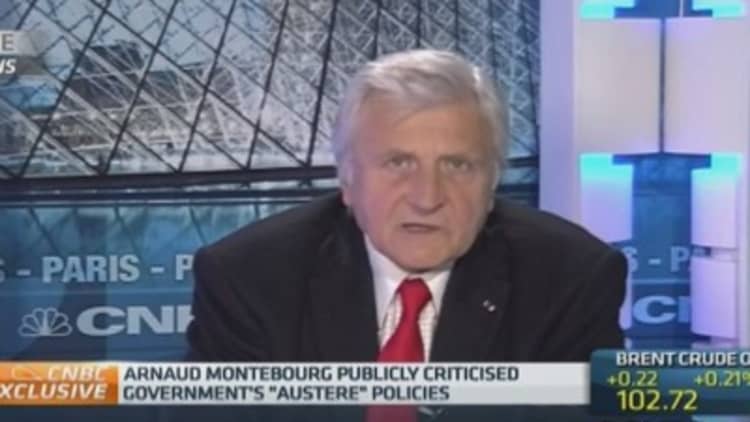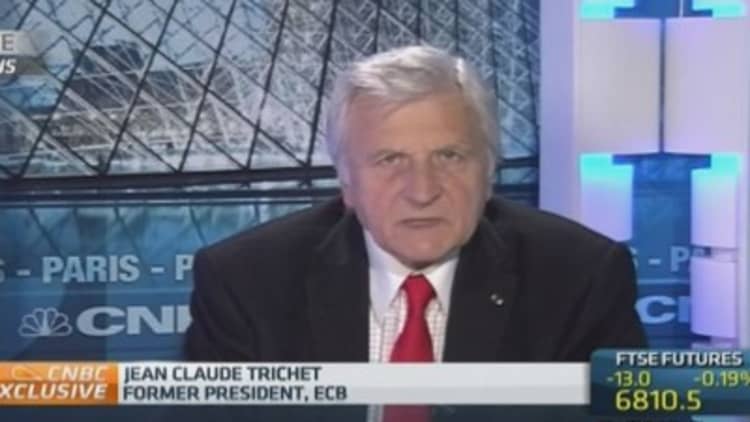
The cabinet reshuffle taking place at the heart of the French government will restore confidence and help to maintain the course of reform plans, according to Jean-Claude Trichet, the former president of the European Central Bank (ECB) and the former governor of the Bank of France.
Trichet said that the changes were "absolutely necessary" after the extreme aggression showed by some of the former members of the cabinet and rejected the idea that it wouldn't make a difference to France's stagnating economy.
"I think there is a lot of confidence," he told CNBC Wednesday. "Now we have a clear line and of course."
In France on Tuesday, President Francois Hollande named a new lineup for his cabinet after left-wing rebels were ejected from their positions on Monday. The most significant and surprising appointment was that of Emmanuel Macron, a former Rothschild banker and ex-presidential economic adviser to Hollande.
Michael Sapin, the current finance minister was widely-tipped to be given the role, but the relatively unknown Macron will now be given the chance to work alongside Sapin. Macron is not a politician and is exactly the opposite of his predecessor Arnaud Montebourg. Montebourg was an anti-austerity advocate and was dismissed on Monday for slamming Hollande's economic policy.
Macron is seen as pro-business and extremely well connected within the industry. He was the main architect behind the reforms passed in the first two years of Hollande's incumbency and has already caused some concern with the extreme left-wing in the ruling Socialist Party.
Read MoreEuro zone yields turn negative on Draghi hopes
"Macron is very well known by all the responsible people that are making the French economy," Trichet added. "I'm very happy."
France - Europe's second-largest economy - has seen dismal economic data recently and has failed to reach any kind of growth trajectory since the euro zone sovereign debt crisis of 2011. New figures in early August showed that the French economy failed to grow during the second quarter of this year after stalling in the first. Hollande - who has suffered badly in the popularity ratings - is eager to push through an austerity program that has yet to be fully implemented, despite neighboring countries having finalized their own long term plans.

Apolline Menut and Fabrice Montagne, two analysts at Barclays say that the appointment of Macron is a very strong political signal and is meant to put an end to the confusion about economic policies.
"It will help to speed up the reform process....however, it will not make it easier for the prime minister to secure support on the left, which entails quite some risk," they said in a note on Wednesday morning.
"At the European level, the reshuffle is important, as it allows Hollande to have a team that does not criticize European policies and Chancellor Merkel. France should be able to clarify its voice and weigh more in the debate over fiscal policy coordination and institutional reforms."
Read MoreEuro trade gets crowded—could it bring pain?
Speaking more broadly, Trichet - who spent 8 years at the helm of the ECB - was coy on whether he thought that a quantitative easing program was imminent for the euro zone. He said that the central bank has to fully implement what has already been announced, referencing a long-term refinancing program and the purchase of asset-backed securities.
He dismissed the idea that Germany was openly calling for caution with regards to aggressive monetary policy. Major asset purchase programs have to be evenly spread in the euro zone and many economists believe that they have the ability to stoke dangerous levels of inflation - something that Germany would be concerned about with the region's economic powerhouse having higher levels of inflation than others.
He also rejected the idea that German officials were trying to manipulate the decisions being made at the ECB with regards to more expansive monetary policy.
"The ECB is a fully independent instruction," he told CNBC. "The ECB is not blocked in any respect." He added that he had not been prevented to do anything by any government during his tenure and there was "absolutely no capacity" for any government to currently do this.



